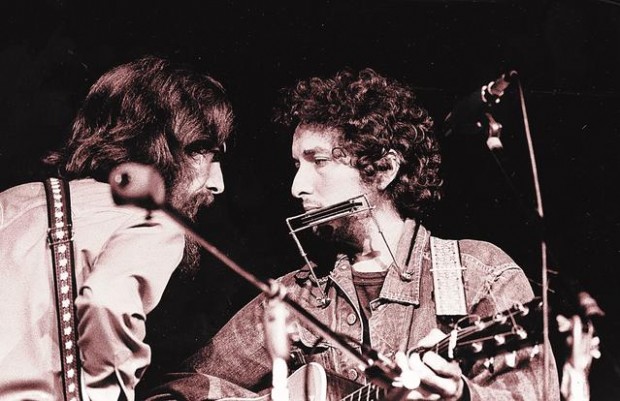Ask Merle Haggard what it's like to tour with folk-rock genius Bob Dylan, and you can almost hear the Hag scratch his head.
"It's just as mysterious as you might imagine," he said, then laughed one of those deep-from-the-gut chortles that wring out the irony of it all.
Last year, Haggard was on the road for 30 to 35 dates with Dylan, and not once did the pair sit down and chat.
"I saw him on the way into the concert, . . . and I asked him, 'Why don't you write me a song?' He said, 'I don't write anymore,' " Haggard said. "He's almost an introvert. He doesn't socialize. Willie (Nelson) and I talked about it. We both admire him, and we've both been on the road with him. But when you go out 30 dates with him, maybe 35, and I don't know any more about him now than I did when we came out.
"He has the right to be his own mysterious way. I admire him for it. I wish that I could shut my mouth."
The Hag shouldn't feel bad. Dylan is a notoriously private person, and he has been throughout most of his career. In the past handful of years, he's done only a scant few interviews; one of his most recent was with Newsweek on the eve of the 2004 release of Dylan's memoir, "Chronicles: Volume One." He made the reporter meet him in a Midwest motel room.
"Chronicles" is not a true memoir. It's more like a long collection of memories, some connected, some not so much. But they provide possibly the clearest insight we've gotten of the man who changed the history of rock music when he plugged his guitar into an amp on a Sunday night in July 1965. In the next 15 minutes at the holy congress of acoustic music, the venerable Newport Folk Festival, Dylan shattered all the sacred cows of folk music and jumped ship to electrified rock, bringing with him an intelligence and insight that some say rock had not experienced until then.
Perhaps it is history's dwelling on that moment that turned Dylan inward. Or maybe the ensuing fame was too much for a humble songsmith who possibly didn't realize that going electric that night would amount to much beyond making his guitar louder.
Dylan was born in Minnesota with the name Robert Allen Zimmerman. He changed it to Bob Dylan when he dropped out of college at the age of 20 and hit the road to experience life as Woody Guthrie had.
Within a year, he was getting attention from Columbia Records, which released his eponymous debut album in 1962. The record included folk and blues standards that sounded entirely new and fresh with Dylan's characteristic nasal vocals.
Throughout the 1960s, Dylan wittingly or unwittingly struck the pose as the hero of the counterculture. Ask some, and they'll swear it was Dylan's influence that pushed the Beatles' songwriting toward introspective themes and social commentary.
Rolling Stone magazine followed that theory in a 2004 article that said Dylan's influence on the Fab Four accounts "for the tart emotional tone of 'Norwegian Wood,' 'I'm Looking Through You,' 'You Won't See Me' and 'If I Needed Someone.' . . . (John) Lennon's 'Nowhere Man,' which he later acknowledged as a depressed self-portrait, and the beautifully reminiscent 'In My Life' both reflect the more serious and personal style of songwriting that Dylan had suddenly made possible."
Over the next four decades, Dylan influenced popular music in ways that are incalculable. But perhaps his biggest mark came with his pioneering songwriting. Possibly influenced by beat poets such as Allen Ginsberg, Dylan created winding, hallucinatory, stream-of-conscious narratives using techniques employed effectively these days by singers such as Ani DiFranco.
His songs are part of our cultural fabric: "Like a Rolling Stone," "All Along the Watchtower," "Tangled Up in Blue," "The Times They Are a-Changin'," "Lay Lady Lay."
He might play those songs and much more when he and the Hag share the Tucson Arena stage Monday night.
Haggard said he doesn't expect any small talk from Dylan then or anywhere on the pair's upcoming spring dates together.
"I think it's almost like by design on his part that he chooses not to discuss anything. He just doesn't want anybody to know anything about him. He doesn't want to talk to people about trivial matters," Haggard said.
We may not get a chance to say hi, but hopefully Dylan, through his music, will open up a bit and let us in.





